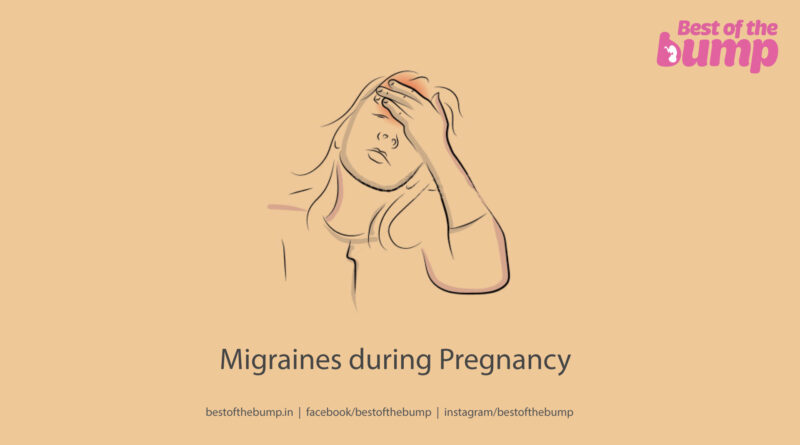Migraines during Pregnancy
Do you experience unbearable headaches more often during pregnancy? It seems like migraines during pregnancy. It has joined the list of pregnancy symptoms alongside morning sickness and nausea. And to add to that, you may also experience blurred vision and numbness! It can feel like your body is taking you on a beautiful journey of creating a new life. Migraines, those severe headaches that make themselves felt, can be quite common during pregnancy. They typically present as a numb pain in the corners of the head or at the base of the skull that radiates outward.

These migraines can last anywhere from a few minutes to several hours, and in severe cases, they can even last for several days. Along with the headache, you may also experience blurred vision, dizziness, flashing lights, nausea, and tingling throughout the body. All of these symptoms are related to the neurological effects of migraines. Hormonal changes during pregnancy redirect blood flow from the brain to the baby, resulting in a drop in blood pressure that can trigger migraines.
If you experienced migraines before pregnancy, you may notice that they become more severe and frequent during this time. Unfortunately, some common migraine medications may pose a risk to the baby and should be avoided. It’s crucial to work with your doctor to find safe alternatives for relief. Consider exploring options such as massage therapy or rejuvenating exercises like yoga.
Taking care of yourself through a balanced diet, adequate sleep, and stress management is essential during pregnancy. Sometimes, getting extra rest can alleviate the effects of a migraine attack. Avoiding processed foods and limiting caffeine intake may also provide temporary relief for some individuals. Remember, while migraines cannot be cured entirely, there are strategies and treatments available to manage the symptoms. Don’t hesitate to seek your doctor’s advice and explore safe options to find relief from these pregnancy-induced headaches. You deserve to enjoy this miraculous journey as comfortably as possible.
How to Manage Migraines During Pregnancy?

Pregnancy, a wondrous phase of life, can also bring about unexpected challenges, including migraines. These intense headaches, often accompanied by a range of discomforting symptoms, can cast a shadow over this joyous journey. Migraines during pregnancy are not uncommon, and understanding their causes, symptoms, and potential remedies becomes crucial for expectant mothers seeking relief and well-being.
Causes and Triggers
Hormonal fluctuations play a significant role in migraine development during pregnancy. The surge of hormones like estrogen, which initially rises and then stabilizes, can lead to the onset of migraines. Additionally, the changes in blood circulation and pressure as the body adapts to pregnancy can contribute to their occurrence. Some common triggers include stress, fatigue, certain foods, dehydration, and changes in sleep patterns.
Symptoms
Migraines during pregnancy present a range of symptoms that extend beyond throbbing head pain. Visual disturbances, such as flashing lights or blurred vision, sensitivity to light and sound, nausea, vomiting, and even tingling sensations, can accompany these headaches. The intensity and duration of migraines can vary, sometimes lasting for hours or days.
Treatment and Management

Managing migraines during pregnancy requires a tailored approach. Consultation with a healthcare provider is essential to determine a safe and effective treatment plan. Due to potential risks, conventional migraine medications might be limited. Instead, non-pharmacological interventions such as relaxation techniques, acupuncture, and biofeedback can offer relief. Maintaining a stable routine, staying hydrated, and getting adequate rest can also help prevent migraine episodes.
Lifestyle Adjustments
Adopting a holistic approach can significantly alleviate migraines. A balanced diet rich in nutrient-dense foods, avoiding triggers, and staying hydrated can make a noticeable difference. Regular exercise, with your doctor’s approval, can reduce stress and promote overall well-being. Incorporating relaxation practices like prenatal yoga, meditation, or deep breathing exercises can provide much-needed relief.
Seeking Support
The emotional and physical toll of migraines during pregnancy should not be underestimated. Open communication with healthcare professionals, including obstetricians and headache specialists, is key. Partnering with a supportive medical team ensures personalized care that considers both maternal and fetal health.
In conclusion, while migraines during pregnancy can present challenges, they need not overshadow the beauty of this transformative experience. Empower yourself with knowledge, seek guidance, explore holistic approaches to manage migraines, and embrace the journey toward motherhood with greater comfort and joy. Your well-being matters, and by addressing migraines head-on, you’re nurturing both yourself and your growing miracle.




